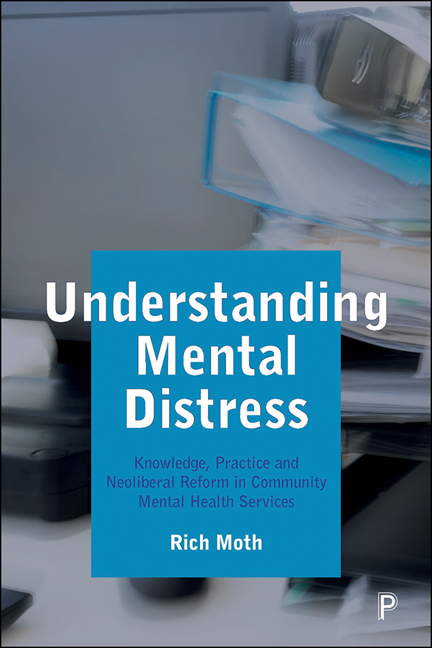 Understanding Mental Distress
Understanding Mental Distress Book contents
- Frontmatter
- Dedication
- Contents
- List of tables
- List of abbreviations
- Notes on the author
- Acknowledgements
- Introduction
- PART I Sociohistorical contexts of policy and practice
- PART II Lived experiences of neoliberal reform
- PART III Theorising knowledge and practice
- Conclusion
- Appendix: methodology
- Notes
- References
- Index
- Frontmatter
- Dedication
- Contents
- List of tables
- List of abbreviations
- Notes on the author
- Acknowledgements
- Introduction
- PART I Sociohistorical contexts of policy and practice
- PART II Lived experiences of neoliberal reform
- PART III Theorising knowledge and practice
- Conclusion
- Appendix: methodology
- Notes
- References
- Index
Summary
In this concluding chapter, I will begin with a brief review of the theoretical orientation of the book and its core arguments. Having done so, I will then consider the sociopolitical implications of these arguments for policy and practice within the mental health system, the wider welfare state and beyond.
The book has argued that in the context of marketised and digitalising mental health service reconfigurations, emergent situational logics and associated directional tendencies such as biomedical residualism have become dominant. While proponents of the strengthening of the market/digital nexus within organisations claim that these reforms deliver increased efficiencies (Eubanks, 2018; Trittin-Ulbrich et al, 2021), the findings from this study have identified significant negative impacts for service users and practitioners. The transition from community care to neoliberal modalities of practice has promoted virtuality, audit-driven and surfaceoriented interventions and relegated embodied co-presence to the margins of the work, restricting opportunities for the development of trust and compassion. This shift from relational approaches to informational practices has, consequently, undermined the contextual mediators of such qualities in the form of relationships, cultures and healing environments (Spandler and Stickley, 2011).
For service users these have produced metric-driven harms in so far as these constrain opportunities for the kinds of interpersonal relational engagements that strengthen processes of (grassroots) recovery. Similarly, for practitioners, digitalisation has facilitated the neoliberal restructuring of the labour process (Moore et al, 2018) and increased managerial control (Reid, 2003). This, as the findings have shown, has resulted in both work intensification and a reduction of discretionary spaces for relationship-based interactions with service users. Because of these interrelated processes, opportunities to practise in ways commensurate with professional and ethical preferences have been limited (Worrall et al, 2010), leading to frustrations and ‘ethical stress’ (Fenton, 2015). However, while, in many cases, practitioners have adjusted to these imposed limitations, challenges to them are also visible, ranging from ‘work arounds’ (Lammi, 2021) such as adapting relational practices to informational environments, or working after hours to create temporal openings for relational casework, to more overt forms of ethico-political intervention (Mather and Seifert, 2017; Karsten, 2021).
This confluence of informational restructuring, notions of user responsibility and older discourses of risk under neoliberalism has generated powerful directional tendencies that constrain relational spaces of support and foreground restrictive and medicalised practices.
- Type
- Chapter
- Information
- Understanding Mental DistressKnowledge, Practice and Neoliberal Reform in Community Mental Health Services, pp. 212 - 216Publisher: Bristol University PressPrint publication year: 2022


